人教版高中英语必修三unit1 Festivals around the world Learning about Language (共26张PPT)
文档属性
| 名称 | 人教版高中英语必修三unit1 Festivals around the world Learning about Language (共26张PPT) | 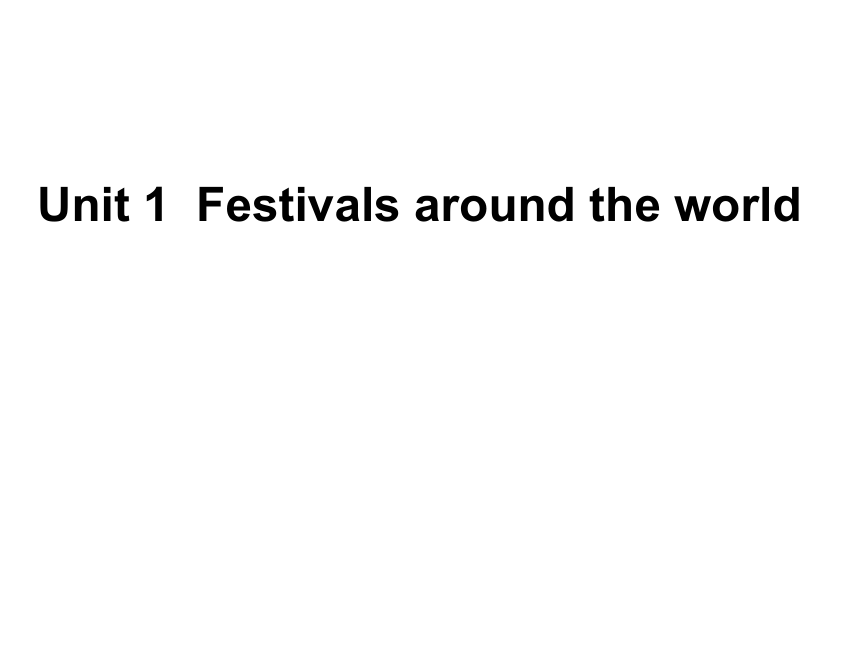 | |
| 格式 | zip | ||
| 文件大小 | 649.8KB | ||
| 资源类型 | 教案 | ||
| 版本资源 | 人教版(新课程标准) | ||
| 科目 | 英语 | ||
| 更新时间 | 2017-03-14 09:52:38 | ||
图片预览

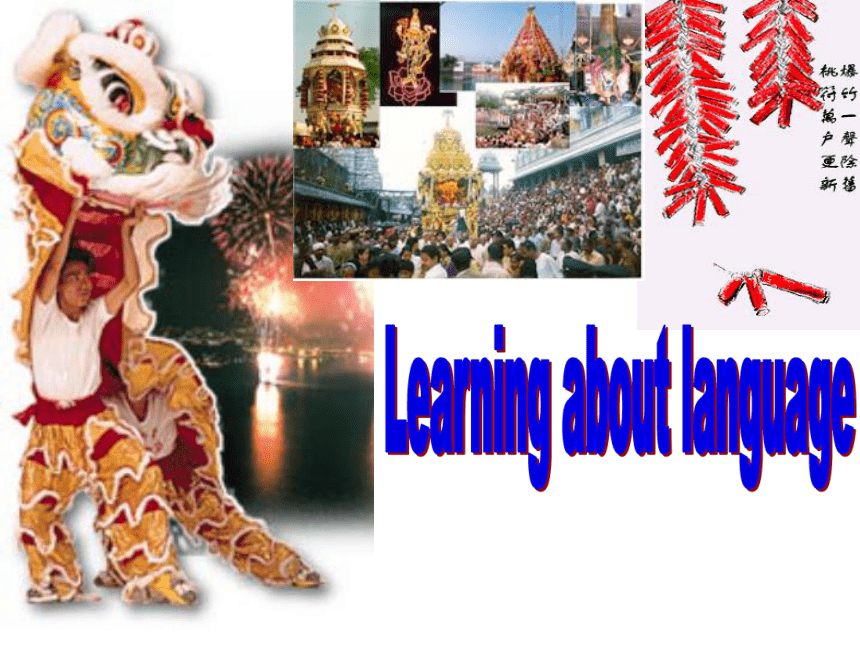
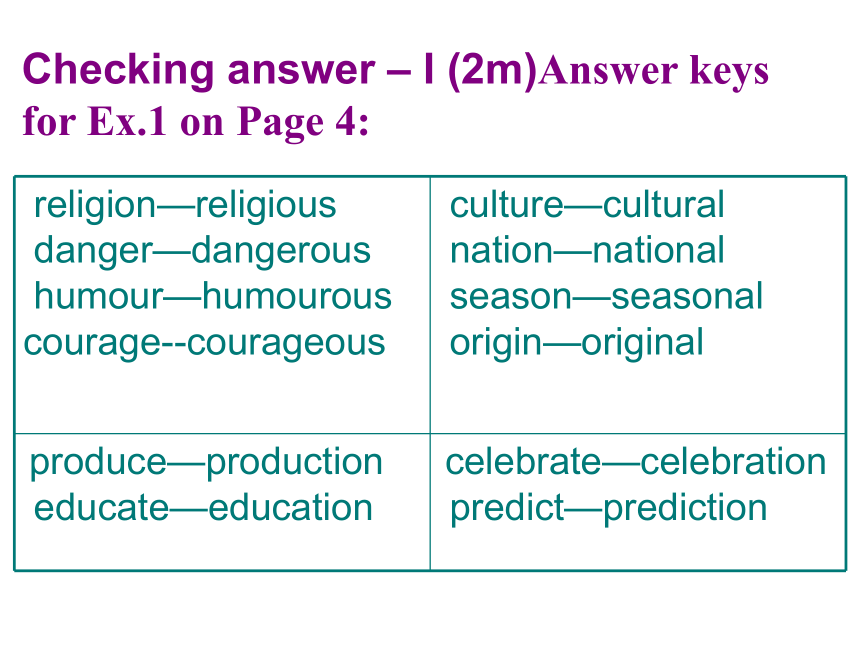
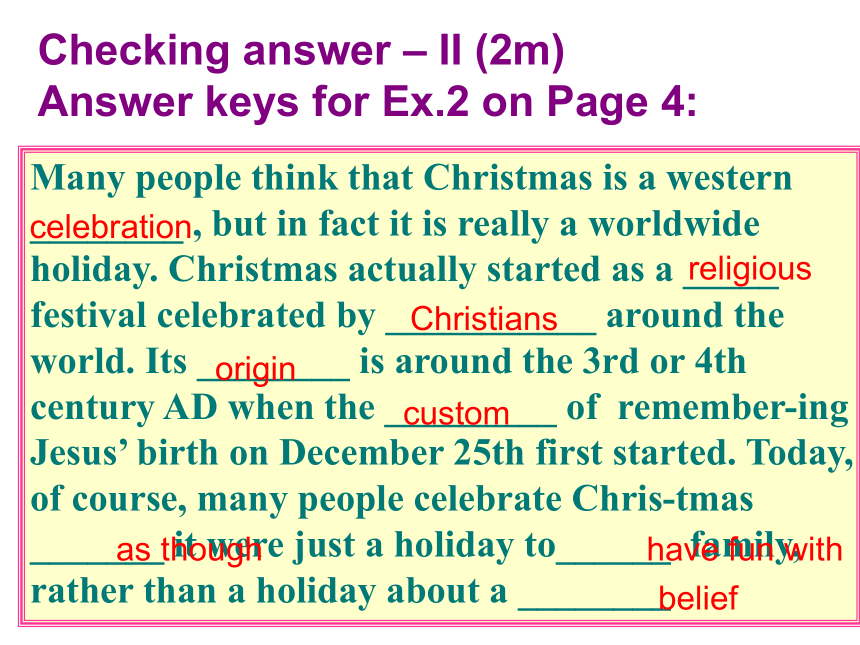
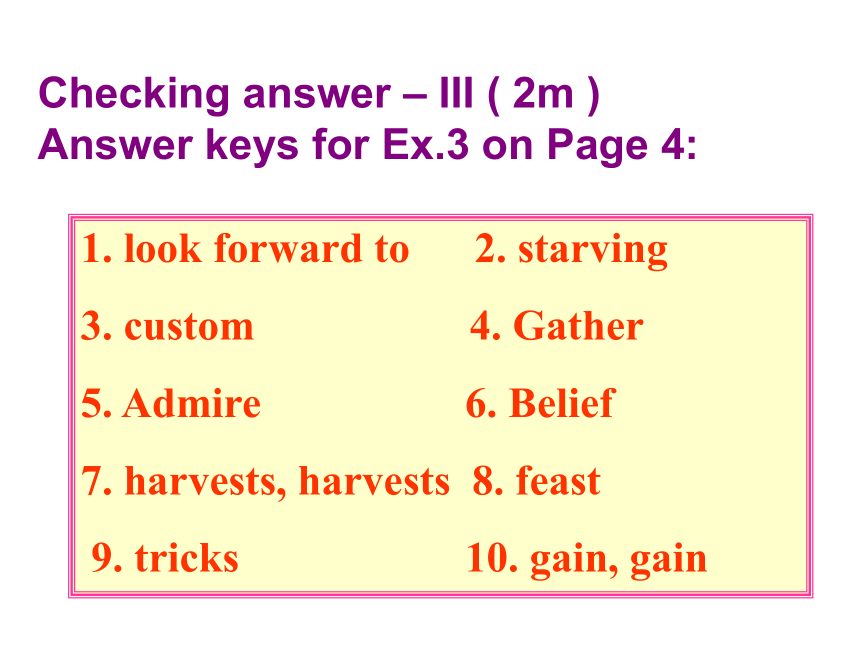
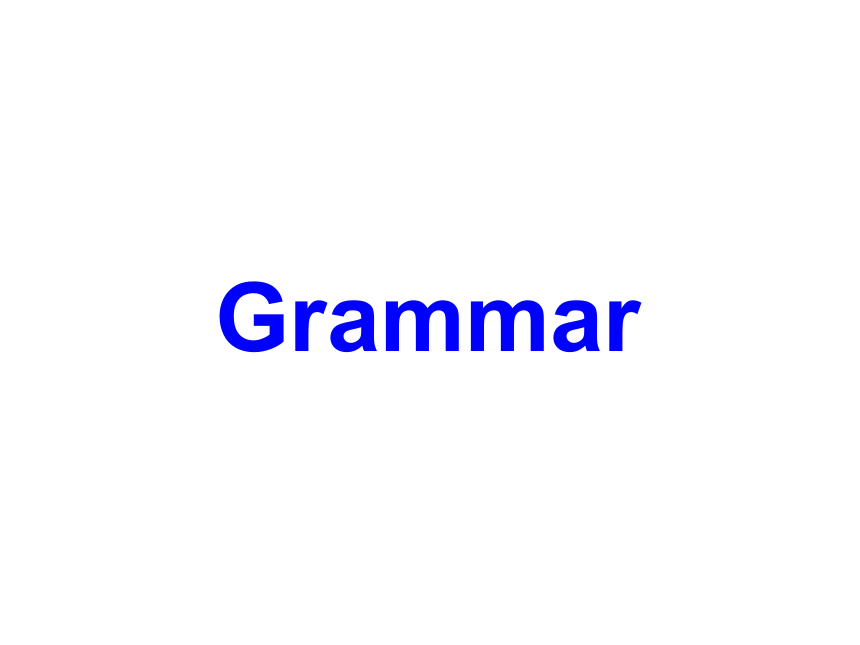
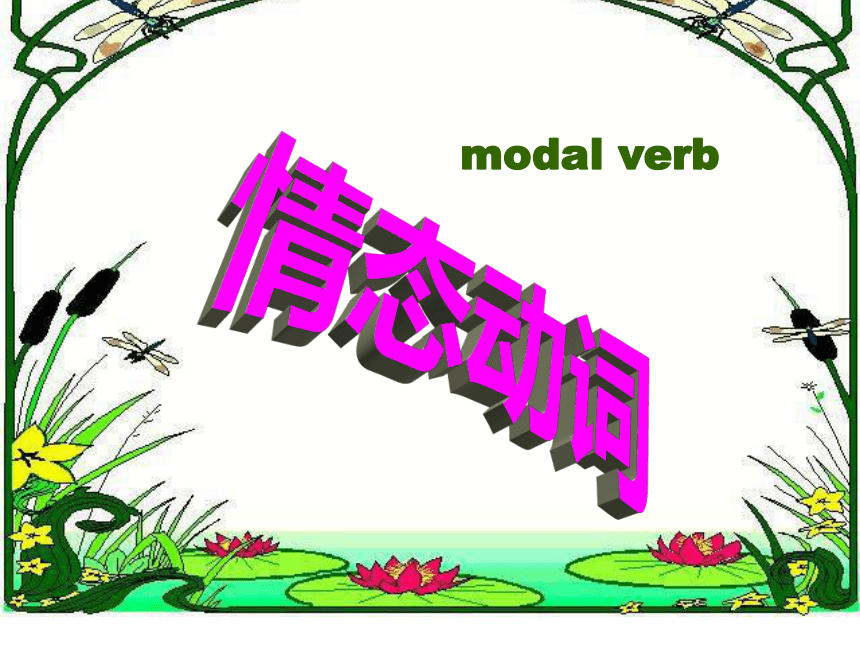
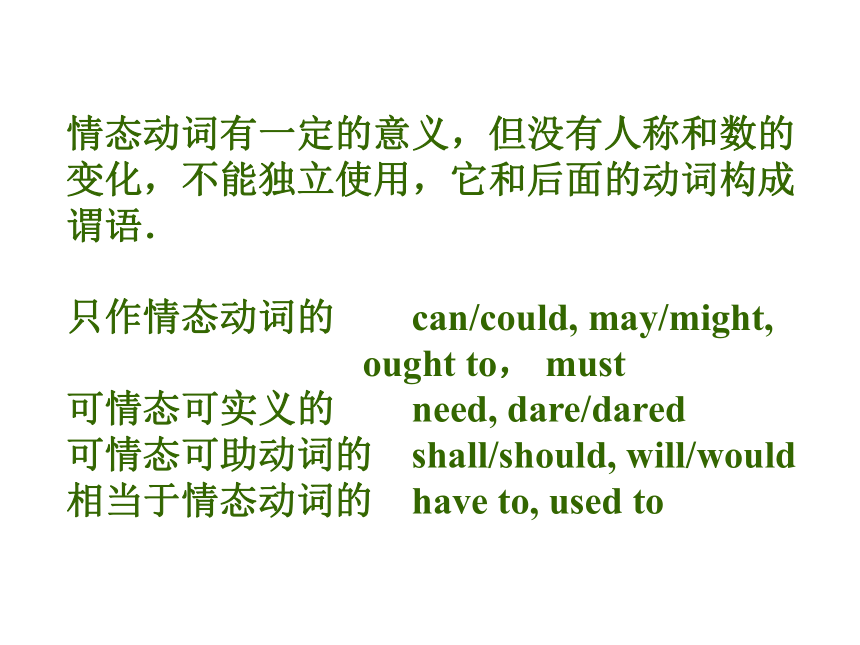
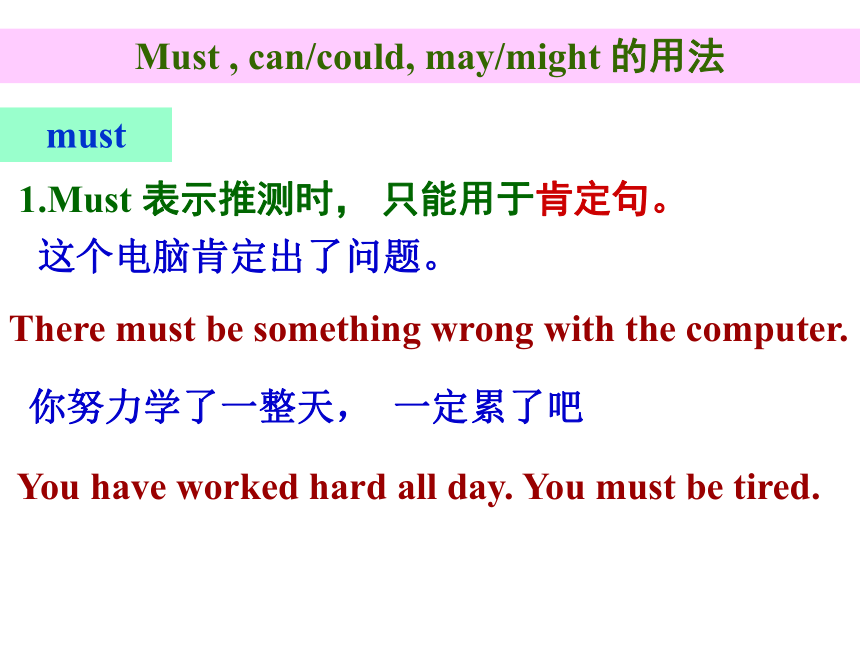
文档简介
课件26张PPT。Unit 1 Festivals around the world
Learning about languageChecking answer – I (2m)Answer keys for Ex.1 on Page 4:Checking answer – II (2m) Answer keys for Ex.2 on Page 4:Many people think that Christmas is a western ________ , but in fact it is really a worldwide holiday. Christmas actually started as a _____ festival celebrated by ___________ around the world. Its ________ is around the 3rd or 4th century AD when the _________ of remember-ing Jesus’ birth on December 25th first started. Today, of course, many people celebrate Chris-tmas _______ it were just a holiday to______ family, rather than a holiday about a ________celebrationreligiousChristiansorigincustomas thoughhave fun with beliefChecking answer – III ( 2m ) Answer keys for Ex.3 on Page 4:look forward to 2. starving
3. custom 4. Gather
5. Admire 6. Belief
7. harvests, harvests 8. feast
9. tricks 10. gain, gainGrammar情态动词modal verb情态动词有一定的意义,但没有人称和数的变化,不能独立使用,它和后面的动词构成谓语.
只作情态动词的 can/could, may/might, ought to, must
可情态可实义的 need, dare/dared
可情态可助动词的 shall/should, will/would
相当于情态动词的 have to, used to
Must , can/could, may/might 的用法must 1.Must 表示推测时, 只能用于肯定句。 这个电脑肯定出了问题。There must be something wrong with the computer. 你努力学了一整天, 一定累了吧 You have worked hard all day. You must be tired. 2.Must +be doing/do 表示对现在的动作进行
肯定推测 他现在一定在看小说 He must be reading novels now. 他们买了一辆新车。 他们一定很有钱 They have bought a new car. They must have
a lot of money. 3. Must +have done 表示对过去发生的事情作出的
肯定 判断 他们在玩篮球, 他们一定完成了作业。 They are playing basketball, they must have
finished their homework. 路是湿的。昨天晚上一定下雨了。 The road is wet. It must have rained last night. can/could can /could 表示推测时,只能用在否定句或疑问句
中。 It’s so late. Can Tom be reading? 这么晚了,汤姆还在看书吗? 这个人不可能是玛丽, 她生病了。 It can’t be Mary. She has fallen ill. 她不可能在说谎。 She couldn’t be telling lies. 2. can/could have done 对过去发生行为的可能性
进行推测: 刚才我还看见他了, 所以他不可能出国的。 I saw him just now so he couldn’t have gone
abroad. 门是锁着的, 所以她不可能在家。 The door was locked. She couldn’t have been at home.3. can/could have done “本可以,本来可能已经”
用于肯定句中,表示对过去发生的事情做出的判断, 你本来可以考的更好。 You could have had a better mark. may/might 1.May/might表示推测时,只能用于陈述句,
表示对现在或将来要发生的动作把握不大。 她们明天可能会到这里来。 They may come here tomorrow. 他们可能还在等我们呢。 They may be still waiting for us. 2.might 可用于指过去的行为或者表示可能性更小。 他也许在作功课吧。 He might be doing his homework now. 我问他我是否可以离开。 I asked him if I might leave. I asked him “May I leave now?” 3.might/may have done,表示对过去发生的动作
进行可能性推测, 他可能去医务室了。 He may have gone to the clinic. 他可能已经从报纸上知道这个消息了。 He might have read about the news in the
newspaper.Will /Would you do…? 表请求
表意志,愿望,决心
would表过去反复发生得动作或某种倾向
“总是,总要”
used to表过去常常(现在已没有这种习惯)
“过去常常”
used to 可于状态动词连用 would不可以
eg. He used to be a quiet boy. ( )
He would be a quiet boy. ( )
√×will/would1. ---- Will you go skating with me this winter vacation?
---- It ___ .
A. all depended B. all depends
C. is all depended D. is all depending解析:答案B。It all depends 是“不确定”、“看情况”的意思。练习B2. I failed in the final examination last term and only then _____ the importance of studies. A. I realized B. I had realized C. had I realized D. did I realize解析:答案为D. 句首为“only + 副词”时,句子要用部分倒装语序;根据语境应为一般过去时态。D3. ---- I would never come to this restaurant again. The food is terrible! ---- _______ . A. Nor am I B. Neither would I C. Same with me D. So do I答案B。第一个句子使用了would, 用neither表示附和的意义时,助动词应与上文一致。BWhen you are very sure of something, you use must in positive sentences and cannot or can’t in negative sentences.e.g. You must be Jeanne. I’m Mathilde Loisel. We
used to know each other very well. It can’t be true! I don’t believe it. When you are quite sure about something, you use can. e.g. Attending a ball can be exciting.Practice 1When you think that something is possible, but you are not very sure, you use could, may or might.e.g.You could borrow some jewellery from your friend Jeanne, who is married to a rich man.You may not know that the necklace I returned is not the one that I had borrowed.Don’t you have a friend who might lend you some jewellery?Practice 2:表示推测——情态动词的重要用法.1. You must be Mr Smith----I was told to expect
you here.
2. He must have known what we wanted.
3. We may have read the same report.
4. He can’t have slept through all that noise.
5. There’s someone outside----who can it be?
6. What can they be doing?
7. These pills might help to cure your disease.
8. You could be right, I suppose.表示推测——情态动词的重要用法.肯定的推测
可能的推测
否定的推测
疑问的推测must 对将来 对现在 对过去情态动词may, might can’t,
couldn’tcan, could + V. + V. + have done
常见must be + be doing + V. + V. + have done
+ be doing
可以用not表示“可能不”
+V. + V. + have done
+ be doing+ V. + V. + have done
+ be doing 1. I don't know where she is, she _______ be in
Wuhan.
2. At this moment, our teacher ________________
our exam papers.
这时,我们老师想必在批改试卷。
3. The road is wet. It ________________ last night.
(rain)
4. Your mother ______________________ for you.
你妈妈一定一直在找你。
maymust be markingmust have rainedmust have been looking5. Philip ________________________ seriously in
the car accident. 菲利普可能在车祸中受了重伤.
6. ---Linda has gone to work, but her bicycle is
still here.
---She _____________________ (go) by bus.
7. Mike ________________ his car, for he came to
work by bus this morning.
迈克一定还没有找回他的车,因为早上他是坐
公共汽车来上班的。
may (might) have been hurtmay (might) have gonecan’t have found
Learning about languageChecking answer – I (2m)Answer keys for Ex.1 on Page 4:Checking answer – II (2m) Answer keys for Ex.2 on Page 4:Many people think that Christmas is a western ________ , but in fact it is really a worldwide holiday. Christmas actually started as a _____ festival celebrated by ___________ around the world. Its ________ is around the 3rd or 4th century AD when the _________ of remember-ing Jesus’ birth on December 25th first started. Today, of course, many people celebrate Chris-tmas _______ it were just a holiday to______ family, rather than a holiday about a ________celebrationreligiousChristiansorigincustomas thoughhave fun with beliefChecking answer – III ( 2m ) Answer keys for Ex.3 on Page 4:look forward to 2. starving
3. custom 4. Gather
5. Admire 6. Belief
7. harvests, harvests 8. feast
9. tricks 10. gain, gainGrammar情态动词modal verb情态动词有一定的意义,但没有人称和数的变化,不能独立使用,它和后面的动词构成谓语.
只作情态动词的 can/could, may/might, ought to, must
可情态可实义的 need, dare/dared
可情态可助动词的 shall/should, will/would
相当于情态动词的 have to, used to
Must , can/could, may/might 的用法must 1.Must 表示推测时, 只能用于肯定句。 这个电脑肯定出了问题。There must be something wrong with the computer. 你努力学了一整天, 一定累了吧 You have worked hard all day. You must be tired. 2.Must +be doing/do 表示对现在的动作进行
肯定推测 他现在一定在看小说 He must be reading novels now. 他们买了一辆新车。 他们一定很有钱 They have bought a new car. They must have
a lot of money. 3. Must +have done 表示对过去发生的事情作出的
肯定 判断 他们在玩篮球, 他们一定完成了作业。 They are playing basketball, they must have
finished their homework. 路是湿的。昨天晚上一定下雨了。 The road is wet. It must have rained last night. can/could can /could 表示推测时,只能用在否定句或疑问句
中。 It’s so late. Can Tom be reading? 这么晚了,汤姆还在看书吗? 这个人不可能是玛丽, 她生病了。 It can’t be Mary. She has fallen ill. 她不可能在说谎。 She couldn’t be telling lies. 2. can/could have done 对过去发生行为的可能性
进行推测: 刚才我还看见他了, 所以他不可能出国的。 I saw him just now so he couldn’t have gone
abroad. 门是锁着的, 所以她不可能在家。 The door was locked. She couldn’t have been at home.3. can/could have done “本可以,本来可能已经”
用于肯定句中,表示对过去发生的事情做出的判断, 你本来可以考的更好。 You could have had a better mark. may/might 1.May/might表示推测时,只能用于陈述句,
表示对现在或将来要发生的动作把握不大。 她们明天可能会到这里来。 They may come here tomorrow. 他们可能还在等我们呢。 They may be still waiting for us. 2.might 可用于指过去的行为或者表示可能性更小。 他也许在作功课吧。 He might be doing his homework now. 我问他我是否可以离开。 I asked him if I might leave. I asked him “May I leave now?” 3.might/may have done,表示对过去发生的动作
进行可能性推测, 他可能去医务室了。 He may have gone to the clinic. 他可能已经从报纸上知道这个消息了。 He might have read about the news in the
newspaper.Will /Would you do…? 表请求
表意志,愿望,决心
would表过去反复发生得动作或某种倾向
“总是,总要”
used to表过去常常(现在已没有这种习惯)
“过去常常”
used to 可于状态动词连用 would不可以
eg. He used to be a quiet boy. ( )
He would be a quiet boy. ( )
√×will/would1. ---- Will you go skating with me this winter vacation?
---- It ___ .
A. all depended B. all depends
C. is all depended D. is all depending解析:答案B。It all depends 是“不确定”、“看情况”的意思。练习B2. I failed in the final examination last term and only then _____ the importance of studies. A. I realized B. I had realized C. had I realized D. did I realize解析:答案为D. 句首为“only + 副词”时,句子要用部分倒装语序;根据语境应为一般过去时态。D3. ---- I would never come to this restaurant again. The food is terrible! ---- _______ . A. Nor am I B. Neither would I C. Same with me D. So do I答案B。第一个句子使用了would, 用neither表示附和的意义时,助动词应与上文一致。BWhen you are very sure of something, you use must in positive sentences and cannot or can’t in negative sentences.e.g. You must be Jeanne. I’m Mathilde Loisel. We
used to know each other very well. It can’t be true! I don’t believe it. When you are quite sure about something, you use can. e.g. Attending a ball can be exciting.Practice 1When you think that something is possible, but you are not very sure, you use could, may or might.e.g.You could borrow some jewellery from your friend Jeanne, who is married to a rich man.You may not know that the necklace I returned is not the one that I had borrowed.Don’t you have a friend who might lend you some jewellery?Practice 2:表示推测——情态动词的重要用法.1. You must be Mr Smith----I was told to expect
you here.
2. He must have known what we wanted.
3. We may have read the same report.
4. He can’t have slept through all that noise.
5. There’s someone outside----who can it be?
6. What can they be doing?
7. These pills might help to cure your disease.
8. You could be right, I suppose.表示推测——情态动词的重要用法.肯定的推测
可能的推测
否定的推测
疑问的推测must 对将来 对现在 对过去情态动词may, might can’t,
couldn’tcan, could + V. + V. + have done
常见must be + be doing + V. + V. + have done
+ be doing
可以用not表示“可能不”
+V. + V. + have done
+ be doing+ V. + V. + have done
+ be doing 1. I don't know where she is, she _______ be in
Wuhan.
2. At this moment, our teacher ________________
our exam papers.
这时,我们老师想必在批改试卷。
3. The road is wet. It ________________ last night.
(rain)
4. Your mother ______________________ for you.
你妈妈一定一直在找你。
maymust be markingmust have rainedmust have been looking5. Philip ________________________ seriously in
the car accident. 菲利普可能在车祸中受了重伤.
6. ---Linda has gone to work, but her bicycle is
still here.
---She _____________________ (go) by bus.
7. Mike ________________ his car, for he came to
work by bus this morning.
迈克一定还没有找回他的车,因为早上他是坐
公共汽车来上班的。
may (might) have been hurtmay (might) have gonecan’t have found
同课章节目录
